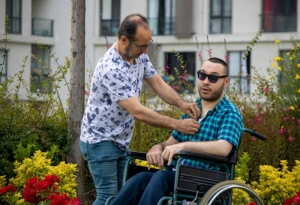Millions of people in England experiencing a mental health crisis can now access 24/7 support through a single phone line, as announced by the NHS. By calling 111 and selecting the mental health option, individuals of all ages, including children, can speak to trained professionals who provide guidance, arrange face-to-face support, or direct them to alternative services like crisis cafés or safe havens. This new service replaces the previously separate local crisis lines and aims to simplify access to urgent mental health care across the country.
This initiative positions the NHS in England as one of the first health systems globally to offer comprehensive mental health crisis support through one unified phone number. The service is designed to ensure that people in crisis receive timely and appropriate care, reducing the need for hospital admissions. In cases where there is a life-threatening risk, every emergency department in England now has liaison psychiatric teams available to offer specialised care, ensuring that those in need are not left without critical support.
The NHS has invested an additional £2.3 billion to expand mental health services, including the recruitment of 8,500 mental health workers to reduce delays and improve access to treatment. The public is encouraged to use this service by calling 111 for urgent mental health support or 999 if there is an immediate risk to life. This expansion reflects the NHS's commitment to addressing the growing demand for mental health care.
Support options, including NHS Talking Therapy Services, are readily available online, ensuring that those with conditions such as anxiety, depression, or PTSD can easily find help. The service also provides tailored support for deaf individuals through the NHS 111 website, making it accessible to a broader population. This comprehensive approach aims to ensure that everyone in need can access the mental health support they require.
A new study by the Scottish Learning Disabilities Observatory reveals that adults with learning disabilities are more likely to die from cancer than the general population, with a higher rate of avoidable cancer deaths. The research, conducted by the University of Glasgow, suggests that later diagnosis, poorer treatment options, and lower treatment compliance may contribute to these worse outcomes.
Published in BMJ Open, the study highlights a greater incidence of metastatic cancer of unknown primary origin among adults with learning disabilities, with three times more deaths occurring at advanced stages compared to the general population. Women with learning disabilities were found to have higher mortality rates from breast cancer, ovarian cancer, and cancers of unknown origin, while men were more likely to die from colorectal cancer and similar unknown origin cancers.
Researchers are now advocating for public health strategies that address the specific needs of individuals with learning disabilities. They emphasise the importance of raising awareness among caregivers about cancer symptoms to support early detection. Additionally, clinicians are urged to provide preventive measures and be mindful that cancer in this population often presents at a late stage.
Professor Deborah Cairns, Director of the Scottish Learning Disabilities Observatory, pointed out that the study highlights persistent health inequalities for people with learning disabilities, including a 20-year mortality gap. Lead researcher Dr. Laura Ward expressed concern over the findings, stressing the need for further investigation into why this population is missing out on potentially lifesaving cancer treatments.
The Disability Advice and Welfare Network (DAWN) has launched an 'Autism Passport' aimed at supporting autistic individuals as they transition from education to employment. This initiative is in response to the findings of the 2024 Buckland report, which revealed that only 30% of autistic adults are in work. DAWN highlights the significant contributions autistic individuals can make to the workplace, including punctuality, dedication, and a strong attention to detail.
Developed in partnership with the Suffolk Law Centre, with input from autistic young people, families, and carers, the Autism Passport provides guidance on various aspects of life, such as Education, Health and Care Plans, financial support, job application processes, disclosing autism, and understanding one’s rights at work.
DAWN’s director, Annie Sands, stressed the importance of showcasing the benefits of employing autistic people, urging businesses to recognise these advantages. Sands also called on the government to act on the recommendations of the Buckland report to make employment more accessible for the autistic community.
In addition to the Employment Passport, DAWN offers another Autism Passport designed to help others quickly understand an individual’s autism and make appropriate adjustments. This resource, available for free download, is useful in various settings, including job centres, healthcare, and legal environments, providing personalised information to facilitate better communication and support for autistic individuals.
More individuals with mental health challenges are being sent far from home for in-patient treatment, despite government pledges to end this practice by 2021. Experts warn that these long-distance placements can lead to prolonged and less effective stays in mental health facilities.
Data from the NHS reveals that while the number of out-of-area placements nearly halved between 2018-19 and 2022-23, it surged by 25% in 2023-24. The government has acknowledged the issue, referring to it as a "broken system" that needs addressing.
Out-of-area placements occur when local beds are unavailable, forcing patients to receive care far from their support networks. This situation can hinder recovery, as patients may struggle to maintain connections with family and friends. In recent years, the use of these placements has increased, despite efforts to reduce them.
The financial burden on the NHS has been significant, with £164 million spent on out-of-area placements in 2023-24, a 43% increase from the previous year. Health professionals emphasise the need for better local support systems and improved community services to prevent unnecessary hospital admissions and ensure patients receive care closer to home.
Balancing full-time work and childcare during the summer holidays is particularly challenging for parents in Guernsey, especially for those with children who have special educational needs and disabilities (SEND). Deputy Sasha Kazantseva-Miller is campaigning for more support, highlighting the struggles faced by these families.
Parents of SEND children often find it difficult to secure appropriate childcare, even when they can afford it. Marc Winn, a parent of a six-year-old daughter with autism, shared that the lack of suitable care options prevents many parents from working and leads to financial hardship. He describes this situation as a "poverty trap" that forces parents to give up their careers.
Kazantseva-Miller emphasises that providing more childcare support, though costly, is a valuable investment. She encourages participation in the States of Guernsey's work survey to help shape future childcare strategies. The initiative aims to work with childcare providers and encourage employers to offer flexible working arrangements.
Louise Leale, CEO of the Youth Commission for Guernsey and Alderney, noted that rising costs have led to price increases for their summer club, Playscheme. However, they strive to keep prices affordable, with some support available for low-income families.







